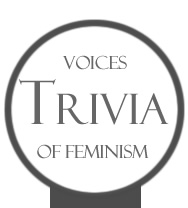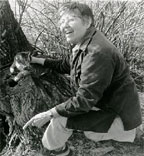Dispatches from an Australian Radicalesbianfeminist
Jean Taylor
January 2009: Fryerstown. We attend a memorial service at a country cemetery for one of our lesbian friends, Heather Chapple, who died in 2007. A solid block of stone with a plaque and a bird bath hollowed out at the top have been placed on her grave, and we're encouraged to fill the bird bath with water as we sing and pay our respects to Heather and the lesbian activist work she did during her lifetime.
In Melbourne, at the 21st annual lesbian and gay Midsumma Festival, we go to the opening of an exhibition by Aboriginal and Torres Strait Islander lesbian and gay artists, Big Blak Dot, at the Koorie Heritage Trust. We've already been to a lesbian writers reading at the local lesbian and gay bookshop, Hares and Hyenas, and have tickets to see several lesbian plays over the next few days.
In contrast to the festival, most of the time we live in a world where lesbians are marginalized and co-opted at best, and totally invisible at worst; where some males are medically turning their bodies into what they believe to be females; where lesbians are obscured in the mixed LGBTIQQ (lesbian, gay, bisexual, transgender, queer, questioning) politics and communities; where we're accepted so long as we don't rock any boats; and where new legislation still doesn't take our particular lesbian rights into proper account. So, it seems to me, it is even more imperative for radicalesbianfeminists to stand up for our own unique view of the world.
February 2009: Brunswick. My latest art work, Keeping Abreast, dedicated to the memory of lesbians who have died of cancer and to the courage of those living with cancer, is on display at the Counihan Gallery along with work by about sixty other local womyn artists. In Victoria, the bush fires – some deliberately lit – have killed an unprecedented number of people. As we watch the devastation on TV, we cry. It seems that we're all contributing to global warming at the rate of knots, seems that after over two hundred years in this country, we still haven't learned how to live as harmoniously and ecologically as the Aboriginal and Islander people did for the previous 100,000 years.
And for those of us who identify as radicalesbianfeminists, who were active in the heyday of the Women's Liberation Movement during the 1970s, who revolutionised the world with our critical analysis of language and sexism, who were the first ones to speak out about incest and domestic violence, who came out at a time when lesbians could lose their jobs and be refused housing, who set up refuges, activist collectives and rape crisis centres to support and inform womyn, we also seem to be a dying breed.
March 2009: Brunswick East/Melbourne. The Victorian Women's Liberation and Lesbian Feminist Archives collective, established in 1983 to collect and preserve our herstorical material, has its first meeting of the year at my place. We talk about the new website we've established, of continuing our work of listing the material in the collection to make it accessible for research and other purposes and what we'll be doing for the coming year.
At the 19th Melbourne Queer Film Festival, we see several films from around the world and are generally impressed by lesbian filmmaking that evokes the way we live and love in different cultures.
No, we're not extinct, nor will we be any time soon. In fact, there seem to be more lesbians out and about, in TV shows, in parliament, working as doctors and lawyers, playing international sport and having babies, than we had ever imagined possible. Although it's hard not to wince when people use words like "chicks" and "ladies" and "girls" as if there hadn't been a feminist revolution to radicalise our use of language.
At the Long Breast Press collective meeting we plan another small book launch of Willing Up and Keeling Over: A Lesbian Handbook of Death Rights and Rituals to be held in rural Victoria this time for all the country dykes. We also make plans to have the book reprinted as issue 79 of Sinister Wisdom.
The book launch of Women Working Together: Suffrage and Onwards compiled by Geraldine Robertson and published by Women's Web is a joyous occasion. Credit is paid to the 600 feminist activists mentioned in the book who were part of the Women's Movement over these past one hundred or so years. But disturbingly, at no time is the word lesbian spoken out loud by any of the speakers, some of whom are lesbians.
It's the feminist politics that seems to be missing today. Or maybe it's just that younger lesbians are more concerned about the environment or global warming or water shortage than about sexism or lesbophobia. No one really wants to know about, nor do they appreciate, what we did back then to make the world a better place for womyn. We '70s dykes really do seem to be dinosaurs whose stories will die with us.
April 2009: Parkville/Coburg. My youngest grandchild is being christened. I eschewed any kind of religious practise several decades ago but because being a grandmother to four grandchildren is one of my deepest ongoing joys, I attend the brief church service and mingle with the extended family members afterwards with my partner. Along with a whole swag of other laws that have been changed recently in Australia, one gives equal rights to lesbians and gays regarding the government's welfare agency policies. Now it is mandatory for lesbian couples to declare their partnership. This means, for example, that lesbian couples on the Old Age Pension will lose approximately $50 a week each on the grounds that couples who share their living costs have a "financial advantage." We lesbians, who have been discriminated against financially, personally and socially since forever, now need to be further disadvantaged by bringing us into line with het couples.
Sexism and lesbophobia are still rife in many parts of the patriarchal community. We're no longer subjected to electric shock treatment, but lesbians are still closeted for fear of being ostracized or losing their jobs or their status in the community. Womyn still don't have equal pay. Lesbians can have babies, but we can't marry our female partners. Not that I am pro-marriage in any way, but I mention this to demonstrate that our society still regards lesbians in many fundamental ways as second-class citizens.
May 2009: Melbourne. I'm now 65 years old. I don't have the energy for taking to the streets I once had. But my passion for my lesbian lover and friends, lesbian feminist politics and community, lesbian culture of art, books, plays, films and periodicals as well as lesbian gatherings and parties, is as strong as ever. I'm glad there are lesbians who are willing to lobby politicians about global warming; I'm well aware these things impact me as a lesbian in the same way they do everyone else. But for me, a lesbian issue is a LESBIAN-specific issue that affects me and my friends directly as lesbians.
I still have a continuing interest in Indigenous issues and my biological family, but the majority of my life involves ensuring that our Lesbian Archives are preserved, attending lesbian-born female gatherings, writing my memoirs, writing our lesbian herstory, writing about our lives as lesbians and in support of lesbian issues, challenging the patriarchal laws that impact me as a lesbian, being an active member of the radicalesbianfeminist community and ensuring that we are available to, and care for, each other in direct and meaningful ways.
Are lesbians going extinct? Not any time soon. But certainly for us radicalesbianfeminists, with no one except ourselves interested in taking up our particular causes, it seems our days as the movers and shakers may well be numbered. Perhaps that's how it needs to be.
Working Notes
As with many of us who now to our complete astonishment and delight suddenly find ourselves eligible to attend the Old Lesbians Organising for Change (OLOC) gatherings for lesbians over 60, the past forty years of my life have been informed and defined by the radical feminist activism of the 1970s.
I came out exactly thirty years ago in 1979 and I am still grateful for the opportunity to live my life as a radicalesbianfeminist activist and to have such a supportive community of like-minded dykes here in Australia and elsewhere. vThis particular piece, "Dispatches from an Australian Radiclesbianfeminist," was written to pay tribute to the life I'm now living. There are not so many of us who identify as radical lesbian feminists anymore and most of those who do are old now, and our priorities have changed.
For myself, knowing I only have a very limited time left to do my work, I'm writing even more these days in order to get as much done as I can: my memoirs, the herstories of the Women's Liberation Movement and Radical Lesbian Feminist Activism in Victoria as well as essays and articles for various lesbian and feminist publications.
As many of my friends have either died or are living with life-threatening illnesses, every now and then (and far too often) my energy is taken up with caring for lesbians who are dying in order to help ensure that their last days are comfortable.
I'm not on as many activist collectives as I once was but the Long Breast Press, Victorian Women's Liberation and Lesbian Feminist Archives Inc. (www.vwllfa.org.au/index.html) and Dyke Books Inc. ensure that I have more than enough activist work to keep me well occupied.
Living in the inner urban region of a large city means I have access to lesbian and gay festivals, book launches and alternative live theatre and films amongst other things. I also enjoy life with my lover and keep myself occupied doing art work, knitting and being a grandmother. Life is a challenge but it also has its glorious moments and being a radicalesbianfeminist is certainly one of them.
About the Author
Jean Taylor lives and writes, does tai chi and meditates on Wurundjeri country in Melbourne, Australia. Her latest book, Brazen Hussies: A Herstory of Radical Activism in the Women's Liberation Movement in Victoria 1970 - 1979, was published by Dyke Books Inc. in October 2009.
Join our Trivia - Voices of Feminism group on Facebook

